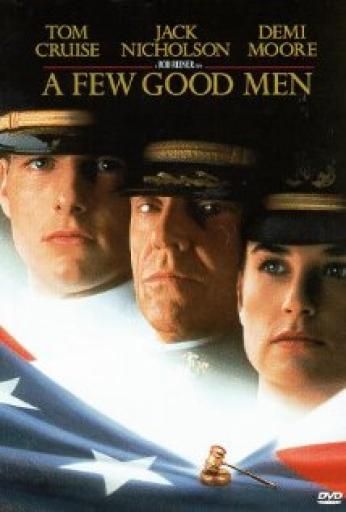A Few Good Men |
|||||||||
|---|---|---|---|---|---|---|---|---|---|
| Primary Creator |
|
||||||||
| Contributor(s) |
|
||||||||
| Properties |
|
||||||||
| Name of Work | A Few Good Men | ||||||||
| Production Date | 1992 | ||||||||
| Production Location |
|
||||||||
| Current Location |
|
||||||||
| Media Types | film | ||||||||
| General Notes | Fascinating juxaposition of the moral codes of the main characters. The highly honorable view of morality and duty to the Corps by the solemn young men charged with murder; The careless, lighthearted manner of the lead defense lawyer (Cruise) under whose glib banter is a brilliant, tough strategist; The bombastic version of the Colonel's (Nicholson) view of military honor and the absolutism of chain of command to "save lives"; The Southern religious version of such a military code of behavior in the squad commander (Keifer Sutherland) All the characters above, plus the characters portrayed by Demi Moore, J.T. Walsh, Kevin Bacon, and Kevin Pollack provide an amazing array of character contrasts which drive the plot. An exceptional work of script writing. | ||||||||
Description
A young marine dies during a hazing attack by two of his peers, at Guantanamo Naval Base (run by Marines). The two men are charged with murder and court martial ensues. The questions at hand are: Were the two men ordered to do an outlawed (but condoned) 'code red' hazing by their superior officers? Is there a coverup by the superior officers? Who are the people of good character?
The clear and complex plot follows the efforts by the legal defense team to uncover the facts, leading to a heart-pounding climax in a character and morality- driven courtroom thriller.
Theme
Commitment to a moral code is central to a good man's life.
Emotional Sum or Sense-of-life
Justice should be fought for, needs to be fought for and can be fragile.
Context Information
Tags
code red, Guantanamo, honor, Marines, Navy

Discussion
- Log in to post comments
Pity And FearPity and Fear are, in their broad use, part of the experience of watching this movie.
This literary work (the script) -- is the closest to what I understand Aristotle to have meant that great drama provided viewers -- a strong sense of pity and fear towards the main characters. That is, a great work shows that conflict and trouble in a hero's life -- in this case the young main character (Lance Corporal Dawson) causes one to feel fear for his life and his admirable character, and one pities both him and his assistant hazer, and one pities the man who died because of an existing medical condition that made a supposedly harmless hazing into a deadly event.